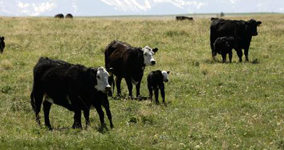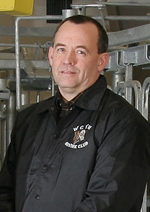Boosting the Calf Crop Percentage in Your Beef Herd: Webinar on Feb. 25
Updated February 28, 2014: Missed the webinar? Find the recording and check for future webinars on the Webinars page.
Reproduction is the basis of profitability in the cow-calf sector. Of course the closer a producer can get to having 100% of their cows deliver healthy, uniform calves that thrive through to weaning, the better their bottom line. Register for this free webinar to hear from industry experts on how those reproductive goals can be achieved. You’ll also hear how ongoing investments in research have improved reproductive efficiency in Canada’s beef herd, and what issues still need to be tackled.
When

Tuesday, February 25th at 7pm MST
- 6:00pm in BC
- 7:00pm in AB
- 8:00pm in SK and MB
- 9:00pm in ON and QC
- 10:00pm in NS, NB and PEI
Duration
1 hour
Cost
BCRC webinars are available and free of charge thanks to guest speakers who volunteer their time and expertise to support advancements in the Canadian beef industry.
Interested but aren’t available that evening?
REGISTER ANYWAY! This webinar will be recorded and posted online at a later date. All registrants will receive a link to the recording and supplemental information on reproduction. By attending the live event, you’ll have the opportunity to interact and ask questions too.
Speakers
John Campbell, DVM, Ph.D. – Researcher and Professor at the University of Saskatchewan

Dr. Campbell has been a professor at the Western College of Veterinary Medicine (WCVM) since 1991 and is currently the Head of the Department of Large Animal Clinical Sciences. Dr. Campbell’s teaching and research at WCVM are focused on production limiting diseases in beef cattle in both cow-calf herds and feedlots. He also leads the WCVM Disease Investigation Unit which investigates unusual disease outbreaks in livestock herds across Saskatchewan. Dr. Campbell has been involved in a number of research projects funded by the BCRC; information on those projects are available on BeefResearch.ca.
Reynold Bergen, Ph.D. – Canadian Cattlemen’s Association/BCRC Science Director

Dr. Bergen provides scientific and industry expertise to the BCRC and Beef Science Cluster, working with industry to identify research priorities, review research proposals and scientific reports, and engaging with industry and research experts on an ongoing basis. To ensure producers have access to current research information, he develops factsheets for projects funded through the BCRC, and writes articles that are available through the CCA, provincial beef organizations, various ag media outlets and BeefResearch.ca. Reynold also works to gather and provide relevant research-based information for industry, public and government communications on specific issues.
What is a webinar?
Webinars are just like attending a workshop or conference, but from the comfort of your own home or office. We bring the presentation right to you. They’re easy to join and participate in. A solid, high-speed internet connection is required.
All you need to do is register beforehand, and about 5-10 minutes before the webinar is scheduled to begin, click the link you were provided when you registered. Then turn up your computer speakers, or call the phone number provided to listen over the phone. That’s it! Sit back and enjoy. As a participant, you can anonymously answer polls and surveys, and will have the opportunity to ask questions near the end of the webinar.
Don’t have high-speed internet?
Consider calling a neighbor that does and watch the webinar together, or call your regional ag office to ask whether arranging a group viewing is possible.
Click here to subscribe to the BCRC Blog and receive email notifications when new content is posted.
The sharing or reprinting of this BCRC Blog article is welcome and encouraged. Please provide acknowledgement to the Beef Cattle Research Council, list the website address, www.BeefResearch.ca, and let us know you chose to share the article by emailing us at [email protected].
We welcome your questions, comments and suggestions. Contact us directly or generate public discussion by posting your thoughts below.